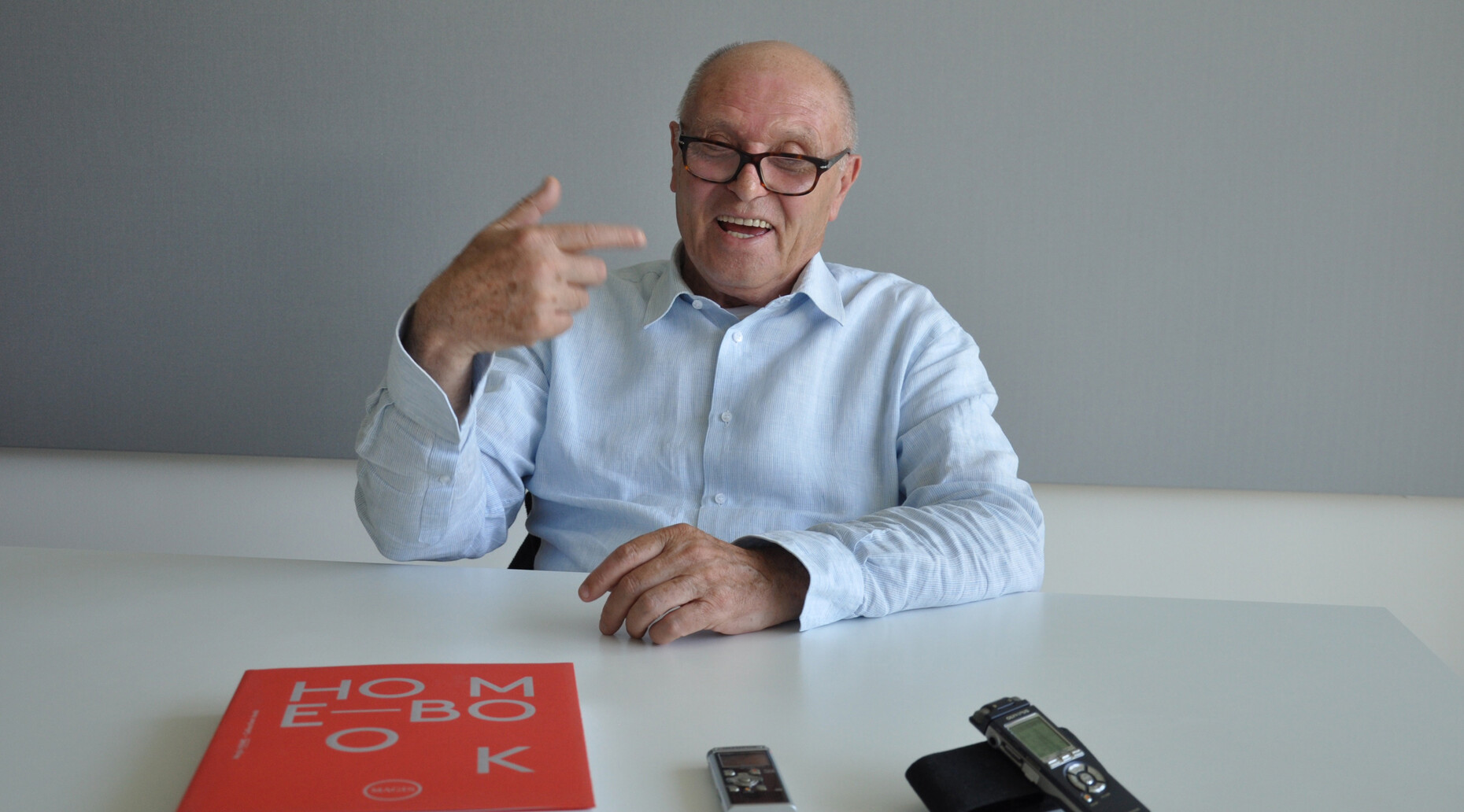STYLEPARK MAGIS – FOCUS ON HOSPITALITY
For me, quality is the future
Thomas Wagner: When I think of Magis, I instantly think of an intensive form of collaboration and hospitality. You bring people together in a special way with your furniture. What does this mean for you?
Eugenio Perazza: First, you have to communicate your ideas clearly and precisely, and of course honestly. Today Magis functions as well as it did 40 years ago. That is a long time. In this regard we can no doubt say that the company enjoys a very good reputation on an international scale. The aspect of hospitality was indeed always very important to me. We build up friendly relations with our customers. Our customers, and consequently the international community, mean a lot to me. I don’t talk of a partnership; a partnership is in a way very formal. Hospitality and friendship in contrast are simple and clear – you work together and are nice to one another. That applies to designers and manufacturers and also to everyone else involved.
Does the open and friendly approach you so carefully nurture also find its way into the choice of materials and artisanal traditions? For example, when you develop cast-iron tables and chairs with the Bouroullecs or team up with Konstantin Grcic to devise a collection made of cast parts.
Eugenio Perazza: This tradition, the idea of hospitality, was realized for the new cast-iron collection developed by Konstantin Grcic, for example. The task was challenging, because we had to find a new contemporary formal language starting with an old established technique. Magis likes to design things that are very Italian. We seek to transport good old Italian tradition as well as the artisanal traditions of the region into the present and the future.
How important is it to you to develop special products and cultivate strong personal relationships?
Eugenio Perazza: Both are very important if you want to establish a good relationship with customers, suppliers, journalists and the national and international Magis community. Amicability and friendly exchange are always important. This form of hospitality characterizes Magis – and that from the very beginning, since Magis was established in 1976.
And you are still busy thinking far into the future?
Eugenio Perazza: In its 40 years in the business, I believe Magis has written some of the finest chapters in the history of design. That's good, but it's the past. I'm more interested in ascertaining whether the future belongs to us. And so, as I look around the company, at the quality of the design projects it's currently working on and in view of the sales seasons of upcoming years and other non-design company projects in the pipeline, I say that the future does indeed belong to Magis. I am always looking to the future. For me, the past is over. Currently, for example, we are exploring a new technology for new projects, because Magis always aims to be unique and universal.
And how do you find out what is typically Magis, unique and yet still universal?
Eugenio Perazza: Magis has in recent years adjusted its approach to the future development of design, aiming at results that ultimately express typically Italian flavors and perfumes. It is reworking certain ideas. First and foremost the idea of artisanal work; it wants to go beyond pure form to achieve an "aesthetics of meaning", a meaning that is genuinely Italian. Because we're convinced that in certain spheres (woodworking, leatherworking, glassblowing, etc.) the Italian artisan knows how to apply the "well made" lesson far better than the artisanship of other countries. I have been working in design for 40 years now and I believe that when developing a design project the idea is the only thing that counts, otherwise design remains purely a stylistic exercise. That means that the idea needs to be found and developed, otherwise it isn’t design in the real sense.
Where do such unmistakable ideas come from?
Eugenio Perazza: They arise from my thinking and my discussions with others who are involved. We put our heads together every day. Every conversation produces a small starting point for a new idea, and a week later this idea may have already taken on a form that is worth pursuing further.
So it starts with dialog?
Eugenio Perazza: We have an expression in Italian: “stazione obliqua”. It refers to something that works well in a certain context and can be transferred to another context to produce something new and useful.
How can you know what will be successful in the future? After all, no-one knows what it holds in store.
Eugenio Perazza: It’s not very hard. For me, quality is the future. Things must be high quality, not a hodgepodge of numerous things. Our aim is to drastically reduce the number of things and focus on the future.
You firmly believe that quality will have a successful future in a society of mass media and mass production?
Eugenio Perazza: Yes, for me the future of Magis lies in what I call smart living and smart working. We need to shift the focus from product to ambience in order to be able to thus ring in the Magis era. That is the future.
Could one say that everything you have developed and produced in the past decades, from the plate racks and household utensils to the tables, chairs and sofas of the current collection, gives rise in its entirety to a certain ambience?
Eugenio Perazza: Absolutely. For example, we are developing a new line with Konstantin Grcic in order to be able to offer an overall solution for the home environment as well as commercial properties. But we need three years in total from idea to market launch.
When will Magis design entire houses?
Eugenio Perazza: No, we certainly won’t be doing that.
So you’re content to stick with furniture and objects and appliances for households?
Eugenio Perazza: Above all furniture.










